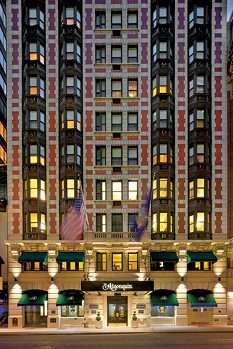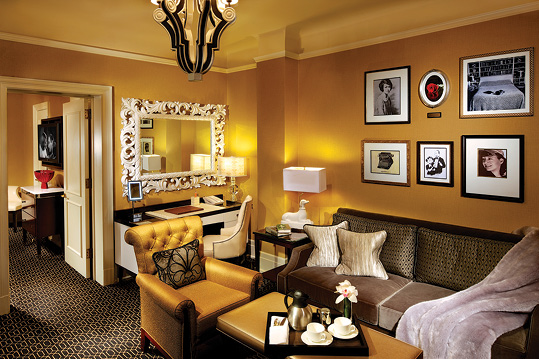- Home
- Media Kit
- Current Issue
- Past Issues
- Ad Specs-Submission
- Ad Print Settings
- Reprints (PDF)
- Photo Specifications (PDF)
- Contact Us


![]()
ONLINE

A Rich History and Experience
Editors’ Note
Manuela Rappenecker assumed her current post in June of 2014. Prior to this, she was General Manager at The Renaissance New York Hotel 57 from October 2012. She has held the roles of Resident Manager at Harbor Beach Marriott Resort & Spa, Director of Operations at Fort Lauderdale Marina Marriott, and Executive Assistant Manager, Rooms Division at The Ritz-Carlton, Philadelphia. Earlier, she held various managerial positions at several Marriott properties. She was an Adjunct Professor in the Hospitality Schools of Florida Atlantic University and Johnson & Wales University. She received her Master of Business Administration Degree from Florida Atlantic University and her Bachelor’s Degree in Marketing/Marketing Management from Florida State University-College of Business.
Property Brief
The Algonquin Hotel (algonquinhotel.com) is located in the heart of Midtown Manhattan on Club Row at 44th Street between Fifth and Sixth Avenues, just steps from Broadway’s theaters and world-class shopping. Home to The Algonquin Round Table made famous by Dorothy Parker and birthplace of The New Yorker, The Algonquin Hotel, which opened in 1902, recently unveiled a $15-million renovation. Changes include upgrades of the historic lobby’s furnishings, the Blue Bar, the renowned Round Table Room restaurant, and all suites and guest rooms.

The Algonquin Hotel exterior
Where do you see the New York hospitality market today and is there opportunity for growth?
There is still opportunity in some of the shoulder nights, which are the Thursday, Friday, and Sunday nights.
Our key to success is making sure we’re continuing to build those nights, because on Tuesday, Wednesday, and Saturday, we have no problem selling out even with the increasing supply in Manhattan, which is mind-boggling sometimes.
If there is any opportunity to inch up year-over-year occupancies, those nights are where I see our biggest opportunity.
We must also make sure we have a good base, be it group business, special corporate business, etc. We do play in some of the Expedia package paths and that type of thing, but we have found what our sweet spot is in terms of a base. Once we’ve got that in, we can usually sell-out thereafter – there is still enough demand to fill those extra rooms.
Currently, there is a bit of a compromise on the rate component – it’s an extremely competitive market out there right now and so much has grown in the Times Square track.

The Dorothy Parker Suite
Do you look competitively at locations only in Times Square or is it broader?
It’s still very siloed, so if people want to be in Times Square, they’re just looking there. It’s amusing that as new properties are being built, one on 38th Street is now considered Times Square – so the track has gotten larger.
Unfortunately, many of our visitors from out of country see Times Square and actually believe they’re going to be right there. We still have a good number of repeat customers because we have a prime location, which helps. We’re one block away from the magnus of Times Square and since we’re between Fifth and Sixth Avenues on a quieter street, we could not be in a more prime location.
Is it important to have brand recognition for this property as part of the Autograph Collection?
It’s definitely a balance. In many ways, I try to keep the Marriott name away from it because I don’t want people to think this is a typical Marriott. It’s a hotel with a rich history and experience.
However, the booking engine of Marriott.com definitely benefits us – about 50 percent of our reservations come through that booking venue. At least 50 to 60 percent of our customers are reward members, which we’ll continue to grow with the Starwood acquisition coming onboard.
When a property like The Algonquin has such history, how do you compete with newer product?
When our owners renovated in 2012, they did a really nice job of updating the rooms while tying in the essence of The Algonquin. A good example is the tile work in the lobby that runs through the marble in the bathrooms.
We’re really just a place for someone to lay their head because then they’re out the door to explore New York City. The Blue Bar is a piece of that and the lobby bar is an important piece, as well. It’s more about making sure we hold true to the lobby socializing; making sure we have clean functional rooms, but it’s almost secondary to the rest of the experience we’re providing.
Do you have to offer the food and beverage service today and can it drive profit?
We’re lucky in that we have a strong local following, most specifically in the Blue Bar. From 4:30 to 7:30 PM our Blue Bar is packed Monday through Friday. It’s our more masculine bar.
The lobby bar is our more feminine bar. We don’t see a ton of hotel guests here. Instead, it’s the pre-theater and post-theater crowd, and people who know the story of The Algonquin and are on their computers writing the next great American novel with a glass of wine.
It’s a good blend of people that keep those two areas busy. They’re usually drinking versus eating, and we make more money from that than from the food component.
We have also morphed our menus to layer in beside that things that make sense. It’s not about having shrimp cocktail and New York Strips – it’s more about bar bites and quick, easy things for them to eat while they’re having a beverage.
It’s always a balance to figure out what makes fiscal sense going forward.
Dinners aren’t as busy because there are so many options for the guests to try, and many groups like to buy out the area for catering. This is where we see the potential to gain some additional revenues.
In leading the hotel, how valuable has it been to have owners with a long-term mentality that continue to invest in the property?
They have spoiled me as an operator. I am lucky to have fantastic owners. They have a diverse portfolio of properties and they’re often in the city and accessible. They know they’re in it for the long-term so they know they might have to spend money now but it will make sense in a few years because it’s about improving the value of their asset.
How critical is the employee/guest relationship when it comes to building repeat clientele?
I’m very lucky with the associates I have. Every day we read our guest surveys and our employees are often mentioned by name. Our customers know the rooms they like and they enjoy being known. With 181 rooms and a relatively small team, they get to know one another.•